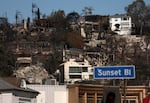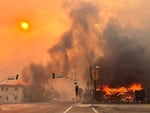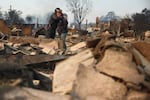
Private firefighting crews hired by insurers and others are raising big ethical questions amid the California wildfires. Pictured here is a snapshot of the devastating impact in Sunset Boulevard in Pacific Palisades, Calif., on Jan. 14, 2025.
Justin Sullivan
Many people had never heard of private firefighters until recent days, when a post on X from a Los Angeles resident went viral.
“Does anyone have access to private firefighters to protect our home in Pacific Palisades? Need to act fast here,” he wrote on X, outlets including the Los Angeles Times reported. “Will pay any amount.”
The post was deleted, but not before drawing attention to a little-known industry: Fire protection crews who are not paid by taxpayer dollars, but by companies and individuals.
But as it turns out, it’s really home insurers, in particular, who have been making use of their services.
Here’s a look at what these companies do — as well as some thorny ethical issues they raise.
So how does it all work?
Not surprisingly, there was a lot of blowback to the notion that some wealthy people were hiring their own firefighters to protect their property: It struck a lot of folks as unfair and just crummy.
Turns out people can contract private firefighters, but it’s not cheap, as recent media reports have made clear. And it’s no guarantee that their properties will be spared.
But these fire protection services are mainly hired by insurers, as a standard part of homeowner policies in fire-prone states — and in California, they operate under state regulations.
Take Wildfire Defense Companies. When there’s a wildfire endangering homes insured by comp, crews from the company show up loaded with their own water supplies.
But David Torgerson, the executive chairman of Wildfire Defense, says most of what they provide is labor to try to prevent fires from engulfing a home in the first place — largely tasks that don’t require water.
“We clean, we sweep, we clear gutters, we take away the places where the embers can ignite on the property or take away the access that the embers have to get in the buildings,” he says.
For example, burning embers can get into the dryer vent. So Wildfire Defense crews will tape the vent shut.
They’ll also return after the fire passes to make sure there isn’t a bush or fence that’s burning that could ignite the house.
What’s in it for insurance companies?
By providing these services, insurance companies are able to limit their losses due to wildfires. Offering this protection as part of an insurance policy can be a selling point, too, when people are shopping for coverage.
For example, the insurer USAA includes this kind of service as a standard part of their homeowners' policies in 15 states.
Rebekah Nelson, Catastrophe Communications Director for USAA, said the company offers it because it’s the right thing to do for their members.
“When you lose everything, this struggle of having to find a new home and find a place to live and get new belongings, it’s terrible. And if we can save one home by offering this service, it’s a win,” she says.
She acknowledged that it benefits insurance companies, too — and said she wished everybody had this service on their insurance policy.

Flames from the wind-driven Eaton Fire engulf a house in Altadena, Calif., on Jan. 8, 2025.
ROBYN BECK/AFP via Getty Images
Not everyone has these policies. Do private crews only help homes covered by some insurers?
It’s hard to know what happens out in the field.
But Nelson at USAA says the providers they use don’t help only their customers. If the services they work with come across an active scene, Nelson, says, “they’re not going to bypass it.”
She adds that a lot of these services are staffed with retired fire chiefs, “so it is embedded in them to help the community.”
But still — these wildfire protection companies are hired on behalf of private insurers, and therefore could have different priorities than firefighters who work for the public.
And not everyone has this kind of coverage, or can afford this coverage –- especially at a time when insurance rates have skyrocketed.
And a lot of the insurers that do offer these services specify that they’re not available for condos, townhomes, or mobile homes.
But aren’t there big ethical questions here?
At the end of the day, those who can afford to hire private firefighters or who have the service as part of their insurance policies would be better protected than those without access to these companies.
“There are tons of ethical questions because wildfires themselves are a very complicated issue,” says Brian Green at the Markkula Center for Applied Ethics at Santa Clara University.
Among the questions: Which firefighters get access to limited water supplies? Will people who have private firefighters still support taxpayer funding for public firefighters?
And do the rich have a separate lane that allows them to avoid facing the huge problems regular people must grapple with?

People embrace as they inspect a family member's property that was destroyed by the fires in Altadena, Calif., on Jan. 9, 2025.
Justin Sullivan/Getty Images
Green says that’s always the case.
“If you have resources and you’re better able to insulate yourselves from all sorts of bad things that are happening around you,” he says. “And once again, that just raises the injustice issue back to the forefront.”
Yet at the heart of the issue, Green adds, is a fundamental problem with government preparedness, “and whether the government is willing to pay enough to make sure that we don’t actually need private firefighters.”
Torgerson, at Wildfire Systems, describes services like his as an adaptation to the fact that wildfires are more frequent and more damaging.
And in a crisis, isn’t it better to have all the help you can get?
“It’s better to have more resources. It’s better to have it not come at a cost to the taxpayer or the policyholder. It’s better to have more structures survive,” he says.
And Torgerson adds that companies like his can help keep insurers in the marketplace. Several insurers have pulled out of California in recent years — and in these Los Angeles wildfires, the insured losses area on track to reach $30 billion or more.
Nonetheless, private firefighters will likely continue to raise thorny ethical questions — with no easy answers.